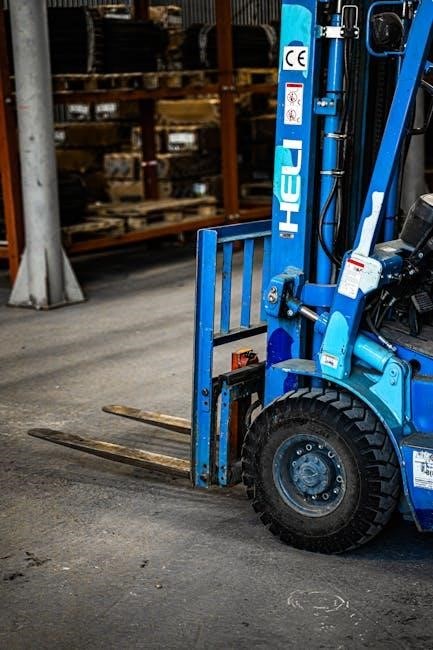Yale fork truck manuals are essential resources for operators, technicians, and owners, providing detailed guidance on operation, maintenance, and repair. These manuals ensure safety, efficiency, and compliance, covering models like the Yale Reach Truck, with ergonomic designs and operator-centric features. They include parts catalogs, service instructions, and troubleshooting tips, helping extend equipment lifespan and optimize workplace productivity. Official manuals are crucial for proper documentation and regulatory adherence, making them indispensable for fork truck management.
Overview of Yale Forklifts and Their Manuals
Yale forklifts are renowned for their durability and reliability, often lasting several years with proper maintenance. Rated for approximately 20,000 operational hours, these machines are designed to handle diverse warehouse and industrial tasks. Their manuals are comprehensive guides tailored for operators, technicians, and owners, covering operation, maintenance, and repair procedures. Available in digital formats, these manuals include parts catalogs, service instructions, and troubleshooting tips. They play a crucial role in ensuring safety, efficiency, and compliance with industry standards. By providing detailed insights into Yale forklifts’ functionality and upkeep, these manuals are indispensable for optimizing performance and extending equipment lifespan.
Importance of Using Official Yale Fork Truck Manuals
Official Yale fork truck manuals are crucial for ensuring safe, efficient, and compliant operation of Yale forklifts. They provide accurate, model-specific instructions for maintenance, troubleshooting, and repairs, minimizing errors and downtime. These manuals are tailored to meet regulatory standards, ensuring operators adhere to safety protocols and legal requirements. Unlike third-party manuals, official documents are verified by Yale, guaranteeing reliability and comprehensiveness. They often include detailed diagrams, parts lists, and step-by-step procedures, making them indispensable for technicians and owners. Using official manuals helps maintain equipment performance, extends lifespan, and supports workplace safety. They are a vital resource for optimizing fork truck functionality and ensuring proper documentation.

Types of Yale Fork Truck Manuals
Yale offers various manuals, including operator, parts, service, and electrical wiring diagrams. These resources cater to different needs, ensuring comprehensive support for forklift maintenance and operation.
Operator Manuals
Operator manuals provide essential guidance for safely and effectively operating Yale forklifts. These manuals detail proper handling techniques, control functions, and pre-operational checks to ensure operator proficiency. They also outline safety protocols and emergency procedures, emphasizing workplace safety. Clear instructions are provided for routine inspections and basic maintenance tasks, helping operators maintain equipment efficiency. By adhering to the guidelines in these manuals, operators can minimize risks and maximize productivity. The content is tailored to promote a thorough understanding of the forklift’s capabilities and limitations, ensuring operators can perform their duties confidently and responsibly.
Parts Manuals
Parts manuals are comprehensive resources detailing the components of Yale forklifts, including part numbers, descriptions, and diagrams. These manuals help users identify and locate specific parts, facilitating maintenance, repairs, and replacements. They often include exploded views of machinery, making it easier to visualize and understand the assembly of components. The manuals also provide ordering information, ensuring users can procure genuine Yale parts. This resource is invaluable for technicians and maintenance personnel, enabling them to efficiently manage parts-related tasks. By referencing these manuals, users can ensure compatibility and accuracy when servicing or upgrading their equipment, maintaining optimal performance and safety standards.
Service and Repair Manuals
Service and repair manuals provide detailed instructions for maintaining and fixing Yale forklifts. These manuals include step-by-step procedures for routine maintenance, diagnostics, and repairs. They cover essential tasks like hydraulic system checks, engine tuning, and electrical system troubleshooting. The manuals also list tools and equipment required for specific repairs, ensuring technicians are well-prepared. By following these guides, users can address issues promptly, minimizing downtime. The manuals emphasize the use of genuine Yale parts to maintain performance and safety. Regular reference to these resources helps prevent minor issues from escalating into major problems, ensuring the forklift operates efficiently and safely over its lifespan.
Electrical Wiring Diagrams
Electrical wiring diagrams are essential for understanding the electrical systems of Yale fork trucks. These diagrams provide detailed schematics of wiring connections, circuits, and components. They help technicians identify and troubleshoot electrical issues efficiently. The diagrams include information on wire colors, connectors, and control modules. They are invaluable for diagnosing problems like faulty sensors, malfunctioning motors, or incorrect voltage supply. By referencing these diagrams, operators and technicians can ensure proper installation, maintenance, and repair of electrical systems. This reduces the risk of electrical failures and enhances overall safety. The diagrams are often color-coded and labeled for clarity, making them a critical resource for maintaining Yale fork trucks effectively.

Where to Find Yale Fork Truck Manuals
Yale fork truck manuals are available through the official Yale website, authorized dealerships, and third-party suppliers. The official website typically offers downloadable PDF versions of manuals, ensuring easy access for operators and technicians. Authorized dealerships provide both digital and print copies, often tailored to specific models. Third-party suppliers and online marketplaces like eBay may also offer manuals, though users should verify authenticity. Additionally, some libraries or industry organizations might have access to these resources. For the most reliable and accurate information, it’s advisable to start with official sources to ensure compliance with safety and operational standards.
Official Yale Website and Dealerships
The official Yale website is the primary source for fork truck manuals, offering direct access to operator, parts, and service guides. Manuals are typically available in downloadable PDF formats, ensuring convenience for users. Authorized Yale dealerships also provide these resources, often tailored to specific models or series; Their knowledgeable staff can assist in locating the correct manual, ensuring users receive accurate and relevant information. Additionally, the official website may offer search tools to filter by model number or equipment type, streamlining the process. Purchasing manuals through official channels guarantees authenticity and compliance with Yale’s quality standards, reducing the risk of outdated or incorrect information.
Authorized Yale Forklift Dealers
Authorized Yale forklift dealers are trusted partners in providing genuine manuals and support. These dealers offer direct access to official Yale fork truck manuals, ensuring accuracy and relevance. They often provide personalized assistance, helping users locate the correct manual for their specific model. In addition to manuals, authorized dealers may offer training materials, parts catalogs, and service guides. Their expertise ensures that users receive up-to-date and compliant documentation. Many dealers also provide online access to manuals through their websites, making it convenient for customers to download or print the necessary resources. Trusting authorized dealers guarantees authenticity and reliability, ensuring optimal performance and safety for Yale equipment.
Third-Party Suppliers and Online Marketplaces
Third-party suppliers and online marketplaces offer alternative sources for Yale fork truck manuals, often providing convenience and accessibility. Websites like eBay, Amazon, and specialized equipment forums may list manual downloads or physical copies. While these sources can be cost-effective, users must exercise caution. Manuals from third parties may be outdated, incomplete, or unofficial, potentially leading to inaccuracies. It’s essential to verify the seller’s credibility and the manual’s authenticity to ensure compliance with safety and operational standards. Additionally, some platforms may offer subscriptions or bundles, which can be useful for accessing multiple resources. However, relying on official channels remains the most reliable option for accurate and up-to-date information.

Downloading and Accessing Yale Manuals
Yale fork truck manuals are readily available in digital formats, ensuring easy access and convenience for operators and technicians. PDF versions allow for quick searches and updates, while organized filing systems enhance efficiency and compliance with safety standards.
PDF Formats and Digital Accessibility
Yale fork truck manuals are widely available in PDF format, offering enhanced accessibility and convenience. This digital format allows users to easily search, download, and store manuals on various devices. PDFs are ideal for quick reference, as they can be accessed on computers, tablets, or smartphones. Many manuals are searchable, enabling users to find specific information rapidly. Additionally, PDFs can be updated regularly to reflect the latest technical specifications and safety guidelines. Digital accessibility ensures that operators and technicians can retrieve essential information without delays, promoting efficiency and compliance with maintenance schedules. This format is particularly beneficial for fleets managing multiple Yale fork trucks.
Organizing Manual Files for Easy Reference
Organizing Yale fork truck manuals is crucial for efficient access and usability. Start by creating a structured digital folder system, categorizing manuals by type, such as operator, parts, or service manuals. Use clear, descriptive filenames and include model numbers or serial codes for easy identification. Consider grouping files by equipment model or year to streamline searches. Implementing a consistent naming convention ensures uniformity. Additionally, use built-in PDF features like bookmarks or tags for quick navigation within large documents. Regularly backing up files to cloud storage or external drives prevents data loss. Proper organization saves time, reduces errors, and enhances overall productivity when referencing critical information.

Maintenance and Troubleshooting
Regular maintenance ensures optimal performance and safety. Routine inspections, lubrication, and battery checks prevent downtime. Troubleshooting guides help identify and resolve issues quickly, minimizing operational disruptions.
Regular Maintenance Procedures
Regular maintenance is crucial for ensuring the optimal performance and longevity of Yale fork trucks. Operators should follow detailed schedules outlined in the manuals, including daily pre-shift inspections. These checks involve verifying fluid levels, tire condition, and hydraulic systems. Lubrication of moving parts and battery maintenance are also essential. Additionally, inspecting belts, hoses, and other components for wear and tear helps prevent unexpected breakdowns. Adhering to Yale’s recommended maintenance intervals ensures compliance with safety standards and reduces the risk of operational failures. Proper record-keeping of maintenance activities is advised to track equipment health and plan future services effectively.
Common Issues and Diagnostic Tips
Yale fork trucks may experience common issues like hydraulic leaks, battery malfunctions, and faulty lift chains. Diagnosing these problems early is key to preventing downtime. Operators can use the manuals to identify warning signs, such as unusual noises or fluid spills. For hydraulic leaks, inspect hoses and connections. Battery issues often stem from improper charging or worn terminals. Lift chain problems may require tension adjustments or replacement. Using diagnostic tools, like multimeters for electrical systems, can help pinpoint faults. Always refer to the manual for specific troubleshooting steps and ensure repairs are done by trained personnel to maintain safety and equipment integrity.

Safety and Operational Guidelines
Adhering to safety protocols ensures operator and workplace well-being. Proper training, load handling, and emergency preparedness are essential for compliant and efficient forklift operations.
Safety Operating Procedures
Yale fork truck manuals emphasize strict adherence to safety protocols to minimize risks. Operators must conduct pre-operation checks, ensuring all safety features function correctly. Proper load handling, including securing and balancing, is crucial to prevent accidents. Maintaining safe speeds and avoiding distractions while operating is mandatory. Clear communication with pedestrians and other workers enhances workplace safety. Operators should follow designated paths and be aware of surroundings. Emergency procedures, such as immediate stop protocols, must be understood and practiced. Regular training updates ensure compliance with safety standards. Personal protective equipment, like hard hats and gloves, should always be worn. These guidelines ensure efficient and secure forklift operations, protecting both the operator and the workplace environment.
Emergency Procedures and Precautions
Yale fork truck manuals detail critical emergency procedures to ensure operator and workplace safety. In case of an accident or system failure, operators must immediately stop the truck, engage the brake, and switch off the engine. If a collision occurs, the area should be secured to prevent further incidents. Operators must notify supervisors and follow first aid protocols if injuries occur. For system malfunctions, such as hydraulic leaks or electrical issues, the truck should be shut down, and authorized personnel must be contacted for repairs. Environmental hazards, like spills or fires, require immediate evacuation and specialized response measures. Regular training on these procedures ensures preparedness and adherence to Yale’s safety guidelines.

Yale Forklift Design and Ergonomics
Yale forklifts are designed with innovative ergonomic principles, focusing on operator comfort and efficiency. Adjustable seating, intuitive controls, and reduced fatigue features enhance workplace productivity and safety standards.

Operator-Centric Features
Yale fork trucks are equipped with operator-centric features designed to enhance comfort, control, and productivity. Adjustable seats, ergonomic control layouts, and intuitive interfaces ensure a personalized fit for operators. The designs reduce fatigue, allowing for extended operation with reduced strain. Clear visibility, precision steering, and responsive controls contribute to seamless navigation. Additionally, Yale incorporates advanced technology, such as customizable performance settings, to align with operator preferences and workload demands. These features prioritize operator well-being and efficiency, ensuring optimal performance in various industrial environments. By focusing on user experience, Yale ensures their equipment meets the diverse needs of modern workplaces, fostering safety and productivity.
Ergonomic Benefits for Workplace Efficiency
Yale fork trucks are engineered with ergonomic designs that significantly enhance workplace efficiency. The intuitive layout of controls reduces operator strain, while adjustable seating and handholds promote comfort during long shifts. Improved visibility and reduced vibration minimize fatigue, allowing operators to work more effectively. These ergonomic features not only boost productivity but also lower the risk of workplace injuries. By prioritizing operator comfort, Yale fork trucks help maintain high performance levels and contribute to a safer, more efficient working environment. This focus on ergonomics ensures that operators can work seamlessly, maximizing overall operational efficiency and workplace satisfaction.

Legal and Compliance Considerations
Yale fork truck manuals emphasize adherence to OSHA standards and regulatory requirements, ensuring safe operations and legal compliance. Proper documentation and training are essential for audits and accountability.
Regulatory Compliance for Forklift Operations
Yale fork truck manuals play a crucial role in ensuring regulatory compliance for forklift operations. They provide detailed guidelines aligned with OSHA standards, such as 29 CFR 1910.178, to promote workplace safety and legal adherence. Operators must undergo training and certification, as outlined in the manuals, to handle equipment safely. Regular inspections and maintenance procedures are also emphasized to meet compliance requirements. Proper documentation of these activities is essential for audits and accountability. By following Yale’s manuals, businesses can ensure their forklift operations align with federal and industry regulations, reducing liability risks and fostering a safer work environment.
Importance of Proper Documentation
Proper documentation is essential for maintaining accountability and ensuring compliance with safety and operational standards. Yale fork truck manuals emphasize the need to keep accurate records of maintenance, inspections, and operator training. This documentation serves as a legal and operational reference, helping businesses demonstrate adherence to regulations during audits. It also provides a clear history of equipment upkeep, which is vital for troubleshooting and extending the lifespan of the forklift. Additionally, proper documentation supports training programs by tracking operator certifications and performance evaluations. By prioritizing detailed and organized records, businesses can enhance operational efficiency and workplace safety while minimizing legal risks and liabilities.
Final Thoughts on Yale Fork Truck Manuals
Encouragement to Use Official Resources
Using official Yale Fork Truck Manuals is crucial for ensuring accuracy, safety, and compliance. These resources are carefully crafted by manufacturers to provide reliable information, minimizing errors and enhancing operational efficiency. Official manuals are regularly updated to reflect the latest industry standards and technical advancements. Relying on unofficial sources can lead to misinformation, potentially causing safety hazards or equipment damage. By prioritizing official Yale resources, businesses can ensure their forklifts are operated and maintained correctly, promoting a safer and more productive workplace. Official manuals are a worthwhile investment for any organization aiming to maximize the lifespan and performance of their Yale fork trucks.

References
- Yale official website: www.yale.com
- Authorized Yale Forklift Dealers: Locate via Yale’s dealer network.
- Technical libraries and industry publications.
Recommended Sources for Further Reading
For comprehensive insights into Yale fork truck manuals, explore the official Yale website, which offers detailed resources and guides. Technical libraries and industry publications provide in-depth information on maintenance and operation. Authorized Yale dealerships often supply supplementary materials tailored to specific models. Additionally, online forums and communities dedicated to material handling can offer practical advice and real-world experiences. Training programs certified by Yale or OSHA are also valuable for operational best practices. Ensure to consult reputable sources to maintain safety, efficiency, and compliance with industry standards.
